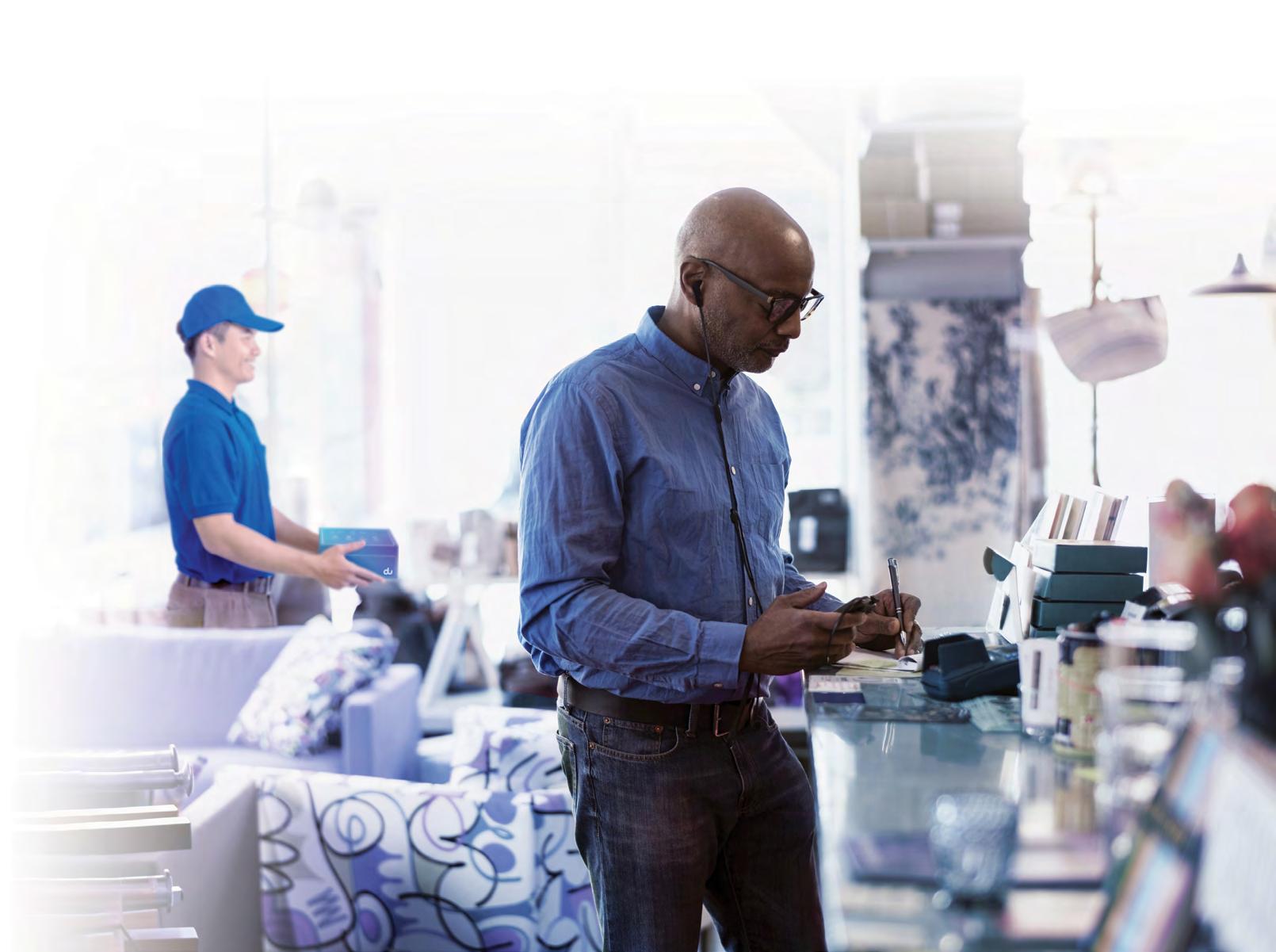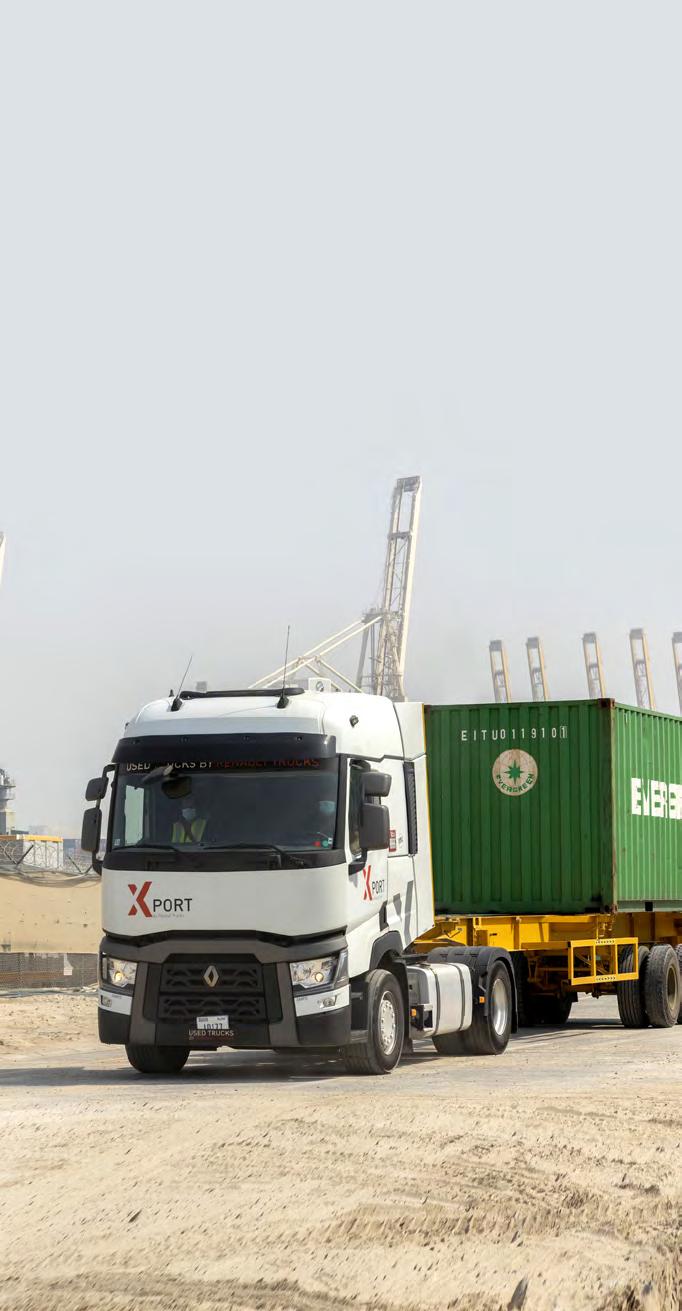Four trends shaping the future of logistics
Dubai Industrial City completes major expansion
Elevating Dubai’s E-Commerce Prospects

Four trends shaping the future of logistics
Dubai Industrial City completes major expansion
Elevating Dubai’s E-Commerce Prospects
UAE’s mission to distribute COVID-19 vaccines will cement its position as the global logistics hub
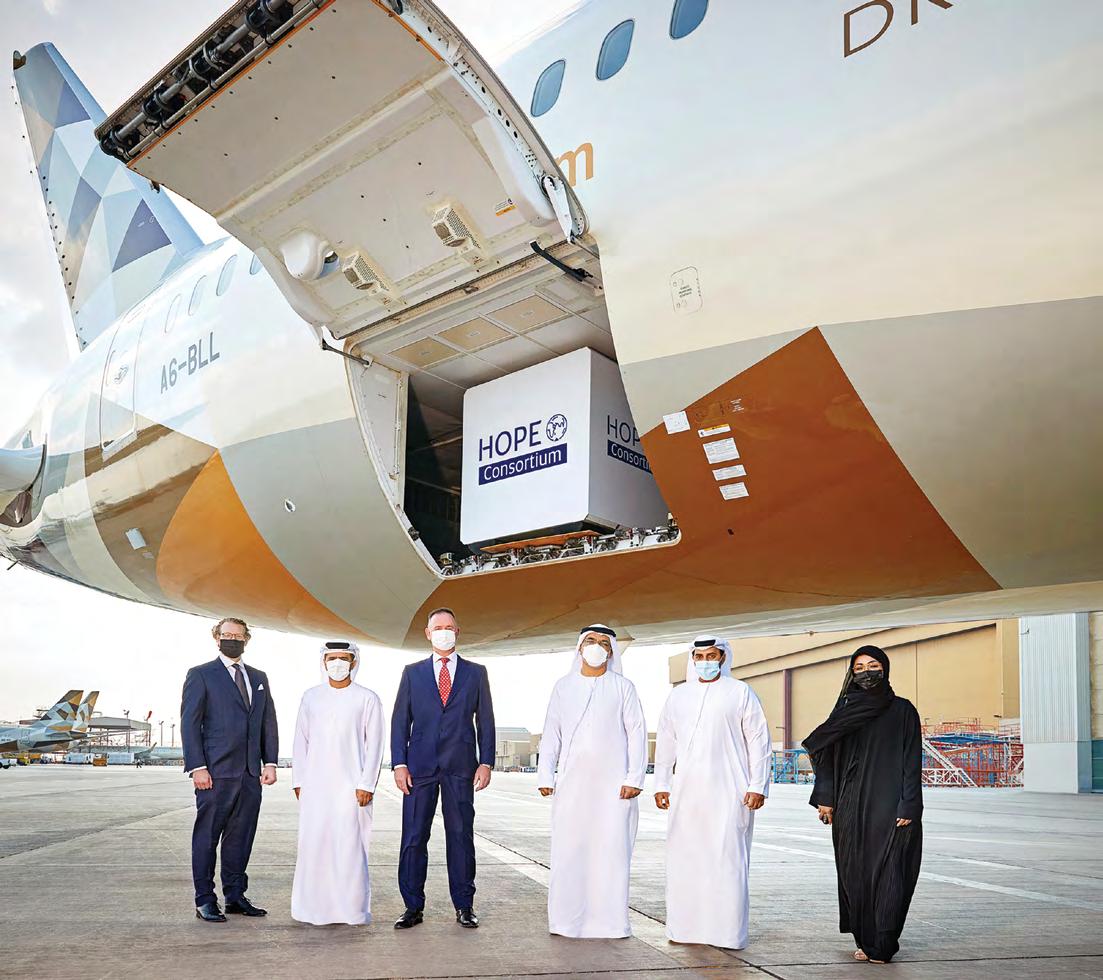
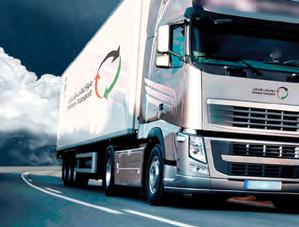
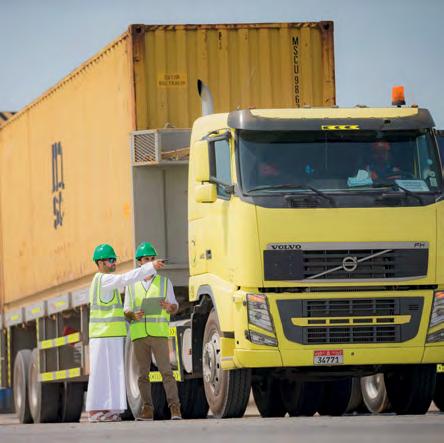


















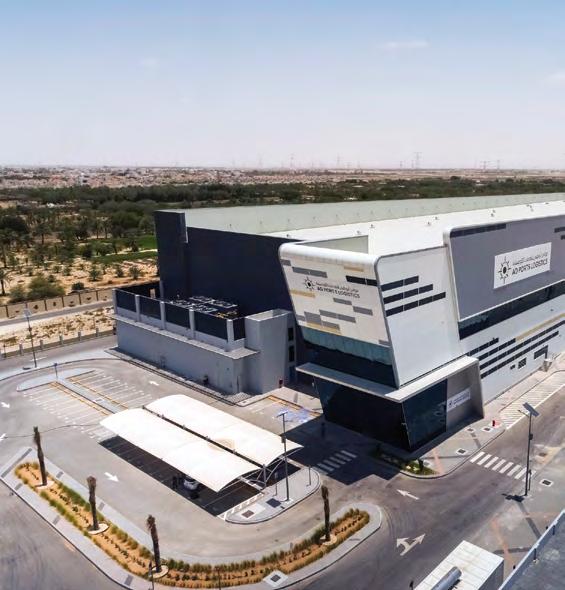
UAE’s mission to distribute COVID-19 vaccines will cement its position as the global logistics hub
18 OP-ED FOUR TRENDS SHAPING THE FUTURE OF LOGISTICS
Post-pandemic economic recovery will be built on free flows of trade, functioning logistics and global connectedness
26 PROJECT
DUBAI INDUSTRIAL CITY COMPLETES MAJOR EXPANSION
Dubai Industrial City, one of the largest industrial hubs in region, has today announced the completion of major construction and infrastructure projects to help its community keep pace with manufacturing and logistics demand in the UAE
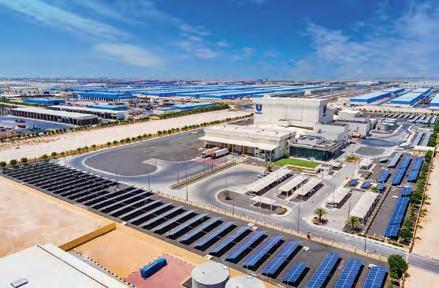
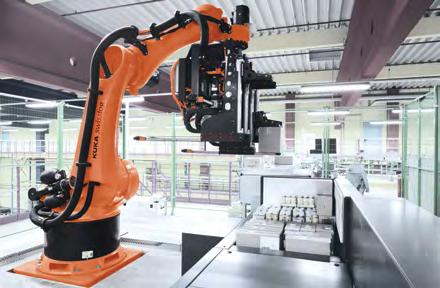
28 COLD CHAIN BEST PRACTICES
Cold Storage Warehouse Design and Management
30 LABOUR MARKET
UAE LABOUR MARKET PICKS UP Robert Half’s 2021 UAE Salary Guide reveals latest salary, benefit and hiring trends for more than 130 positions
32 E-COMMERCE ELEVATING DUBAI’S E-COMMERCE PROSPECTS
Dubai CommerCity partners with Hellmann and DHL Express to provide end-to-end logistics services for customers
34 UNSUNG HEROES
AHMED MOTALEB
Product & Market Manager, Renault Trucks Greater Middle East

business continuity is our top priority. Our initiatives and remote solutions have got you covered in all situations.
du.ae/wegotyourb


In a year of upheavals brought on by Covid-19, CEOs of some of the world’s most influential companies have identified talent risk as a significant challenge to growth. Digital transformation, wider societal contributions and company purpose figure prominently on CEO agendas today, according to a new KPMG study on the evolving priorities of business leaders in 2020.
The KPMG 2020 CEO Outlook: Covid-19 special edition initially surveyed 1,300 CEOs around the world in early 2020, before the full impact of lockdowns was felt. Then, in July and August, the firm conducted a followup survey of 315 CEOs, to gauge how opinion had changed. In addition, 45 CEOs in the UAE participated in the
survey and their findings are used to highlight significant or qualitative differences with global sentiment.
The Covid-19 crisis has served to redefine leadership and reorient CEOs’ priorities. The KPMG report outlines CEO concerns – including talent and geopolitical risk. In January, CEOs ranked talent risk behind 11 other risks to growth. However, since the start of the pandemic, talent has risen to be named as the most significant, perceived threat to their business, ahead of supply chain and environmental risk.
In the survey conducted after the onset of the pandemic, UAE-based CEOs indicated their sense of purpose has helped them better understand what they need to do to meet the needs of their stakeholders, finding it provides a clear framework for making effective Covid-19-related decisions. Eight in ten (79%) CEOs around the world felt a stronger emotional connection to their organization’s purpose since the crisis began. This may be because four in ten (39 percent) have had their health, or the health of one of their family, affected by Covid-19, and over half (55 percent) changed their strategic response to the pandemic as a result.
Kasun
Illankoon Deputy Editor kasun@bncpublishing.net


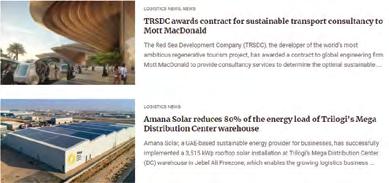
CEO Wissam Younane wissam@bncpublishing.net
DIRECTOR
Rabih Najm rabih@bncpublishing.net
GROUP PUBLISHING DIRECTOR
Joaquim D'Costa jo@bncpublishing.net
+971 50 440 2706
BUSINESS DEVELOPMENT DIRECTOR
Rabih Naderi rabih.naderi@bncpublishing.net
+966 50 328 9818
DEPUTY EDITOR
Kasun Illankoon kasun@bncpublishing.net
EDITORIAL DESIGN
Christian Harb chrisoharb@gmail.com
MARKETING EXECUTIVE
Aaron Sinanbam aj@bncpublishing.net
SUBSCRIBE
subscriptions@bncpublishing.net
For all commercial enquiries, contact sales@bncpublishing.net
All rights reserved © 2020. Opinions expressed are solely those of the contributors.
Logistics News ME and all subsidiary publications in the MENA region are officially licensed exclusively to BNC Publishing in the MENA region by Logistics News ME. No part of this magazine may be reproduced or transmitted in any form or by any means without written permission of the publisher.
Images used in Logistics News ME are credited when necessary. Attributed use of copyrighted images with permission. All images not credited courtesy Shutterstock.
Printed by UPP




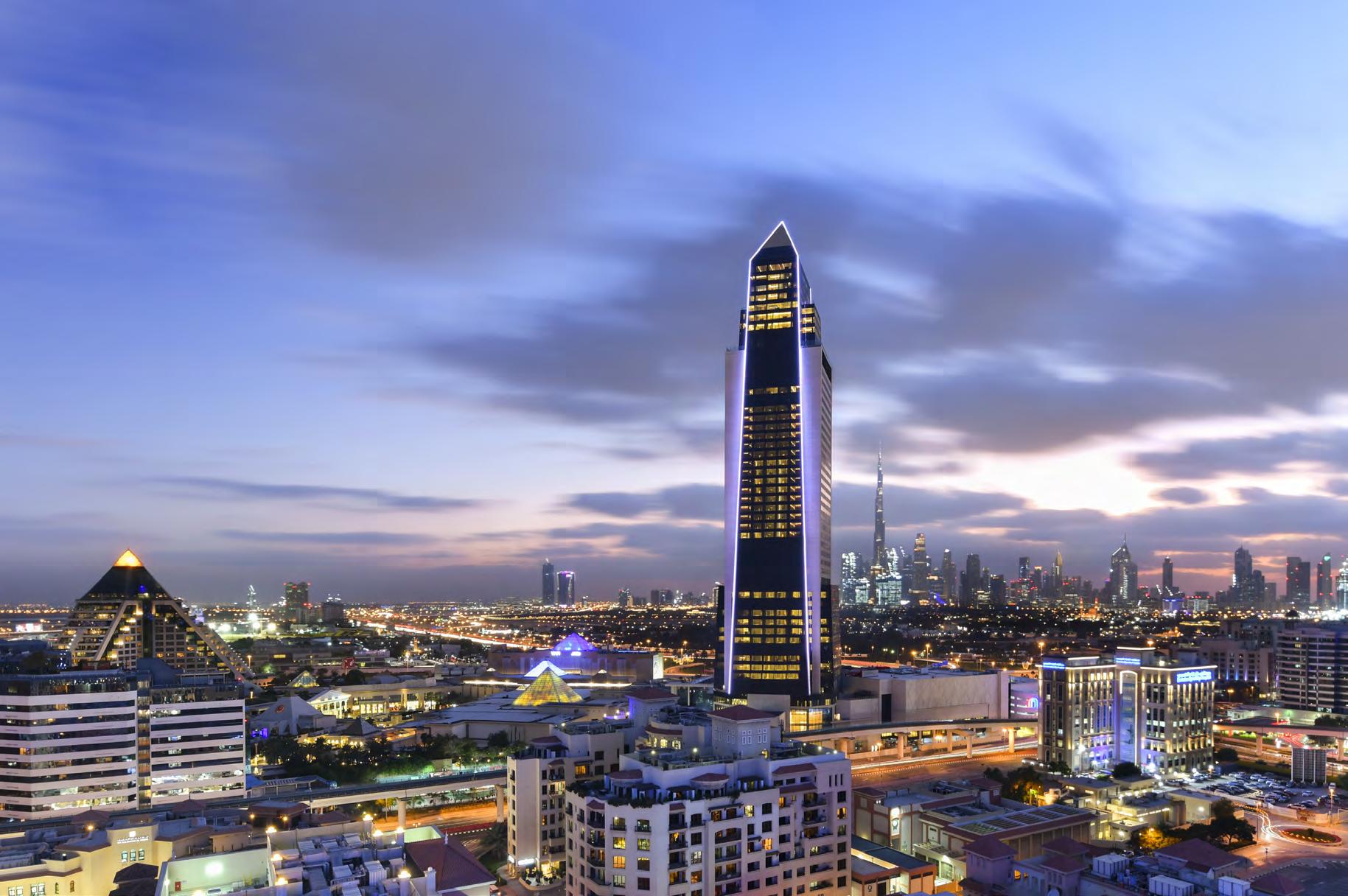
You may have already met at dinner time. Perhaps you saw them delivering something awesome to your neighbour.
One thing is for sure: Every day you’ll see and meet more and more of our delivery specialists in red, ready to put a smile on your face with fast, reliable, and safe deliveries.


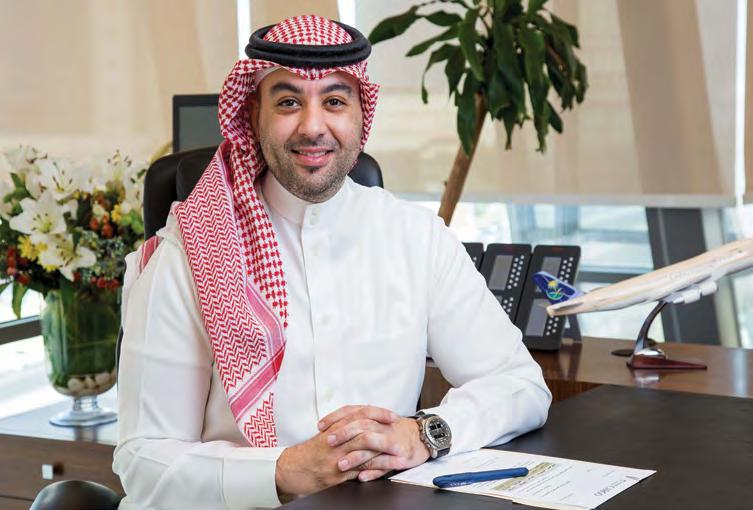
SkyTeam Cargo, the largest alliance in the air cargo industry, has announced the appointment of Omar Hariri as the new chairman of its Executive Board.
Hariri, concurrently the CEO of both Saudi Airlines Cargo Company (Saudia Cargo) and Saudi Arabian Logistics Company (SAL), replaces Shawn Cole, VP Cargo of Delta Airlines, who held the position for three years.
The Executive Board of SkyTeam Cargo Alliance, which is made up of top executives from the group’s 12-member cargo airlines, endorsed Hariri’s new role during their latest meeting.
Commenting on his new role as the Chairman of the SkyTeam Cargo Alliance Executive Board, Hariri said: “It will be an honor chairing the executive board of SkyTeam
Cargo, the largest alliance in the cargo industry accounting for nearly 20% of the global air cargo movement.
SkyTeam Cargo with its two decades of formulation has come a long way and with its 12-member airlines reaching every corner of the globe, enjoys a vast geographic reach and connectivity between the east and west and vice versa.”
“I would like to thank Shawn for his contributions during the last three years and SkyTeam Cargo Alliance and its members for giving me this opportunity. Moving forward, we will continue focusing on actively promoting and strengthening the alliance between the members and at the same time focusing on enhancing our technologically driven operational and network capability to ensure an outclass expe -
rience for our customers. With the growing demand for pharma and e-commerce, our aim is to continue exploring new markets while enhancing connectivity and efficient deliveries, further grow and strengthening the core business of our 12-member airlines.”
Hariri joined Saudi Arabian Airlines Cargo (Saudia Cargo) as CEO in February 2018, bringing with him an extensive experience in air freight and logistics management from his diversified
roles at DHL Express and FedEx Express.
He has a Master of Science Degree in Procurement Logistics and Supply Chain Management from the University of Salford’s Business School in Manchester, United Kingdom.
“It has been a pleasure serving as chairman of the cargo executive board,” Shawn Cole, Vice President of Delta Cargo, commented. “During my time as chairman, we focused on building connectivity, sourcing with economies of scale and connecting with our customers. Our true character was revealed in the face of the many unprecedented challenges brought upon us by COVID-19. I know that Omar Hariri will serve our alliance well as we continue to navigate through the crisis, rebuild network connectivity and contribute to support the transportation of vaccines”.
Saudia Cargo is the latest member of SkyTeam Cargo joining in April of 2019. The group, which marked its 20th anniversary last September, also counts Aeroflot Cargo, Aerolíneas Argentinas Cargo, Aeromexico Cargo, Air France-KLM Cargo, Alitalia Cargo, China Airlines Cargo, China Cargo Airlines, Czech Airlines Cargo, Delta Cargo and Korean Air Cargo as members.
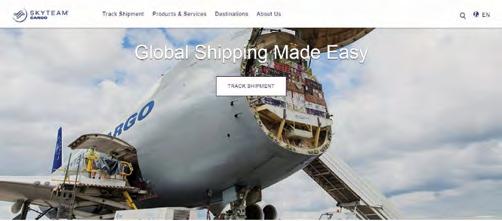
MAN Truck & Bus recently delivered 80 units of the New Lion’s Coach to its customer in Saudi Arabia. This is a milestone in MAN’s journey in the Middle East. This is single largest deal for the new Lion’s Coaches in the country and second one this year. In the beginning of 2020, MAN delivered a coach to AlSalem in the country – the first to a private customer in the Middle East region.
The MAN Lion’s Coach was voted ‘Coach of the Year 2020’. This vehicle combines economic efficiency, comfort, and practicality with innovative technology and timeless design. Other distinguishing features include its exceptional handling behaviour on the road as well as a comprehensive range of convenience features. This coach comes equipped with actual safety solutions both for passengers and driver that have been developed by MAN engineers over the years.
Joerg Mommertz, Senior Vice President and Head of Sales Area Middle East, Africa and Latin America, MAN Truck & Bus, said, “This is a significant moment for us. We are happy with the confidence our customers have placed in our buses. Our commitment is to make the ownership enjoyable & profitable for customers by
offering the best-in-class and we will work to deliver the best support.”
The Lion’s coaches are powered by a 6-cylinder diesel engine that conforms to EEV emission norms and delivers 440 hp. They are also equipped with Automated MAN TipMatic 12 OD gearbox, with retarder; air-conditioning system engineered for hot climates; driver assistance systems such as Electronic stability program (ESP), Lane Guard System (LGS), Emergency Brake Assist (EBA) and Adaptive Cruise Control; ergonomic seating layout with impressive passenger comfort together with features like USB sockets at passenger seats; Advanced Multi Media Coach (MMC) and two LCD monitors.
The mark of the lion: MAN Lion’s Coach
For customers looking for state-of-theart equipment that offers maximum functionality and is a sound investment, the MAN Lion’s Coach is an ideal solution for their fleet. This is a solid vehicle you can truly rely on. The highly efficient coach exudes power and strength, yet actually saves on fuel and is based on a sustainable driving concept. “The MAN Lion’s Coach is the vehicle that has
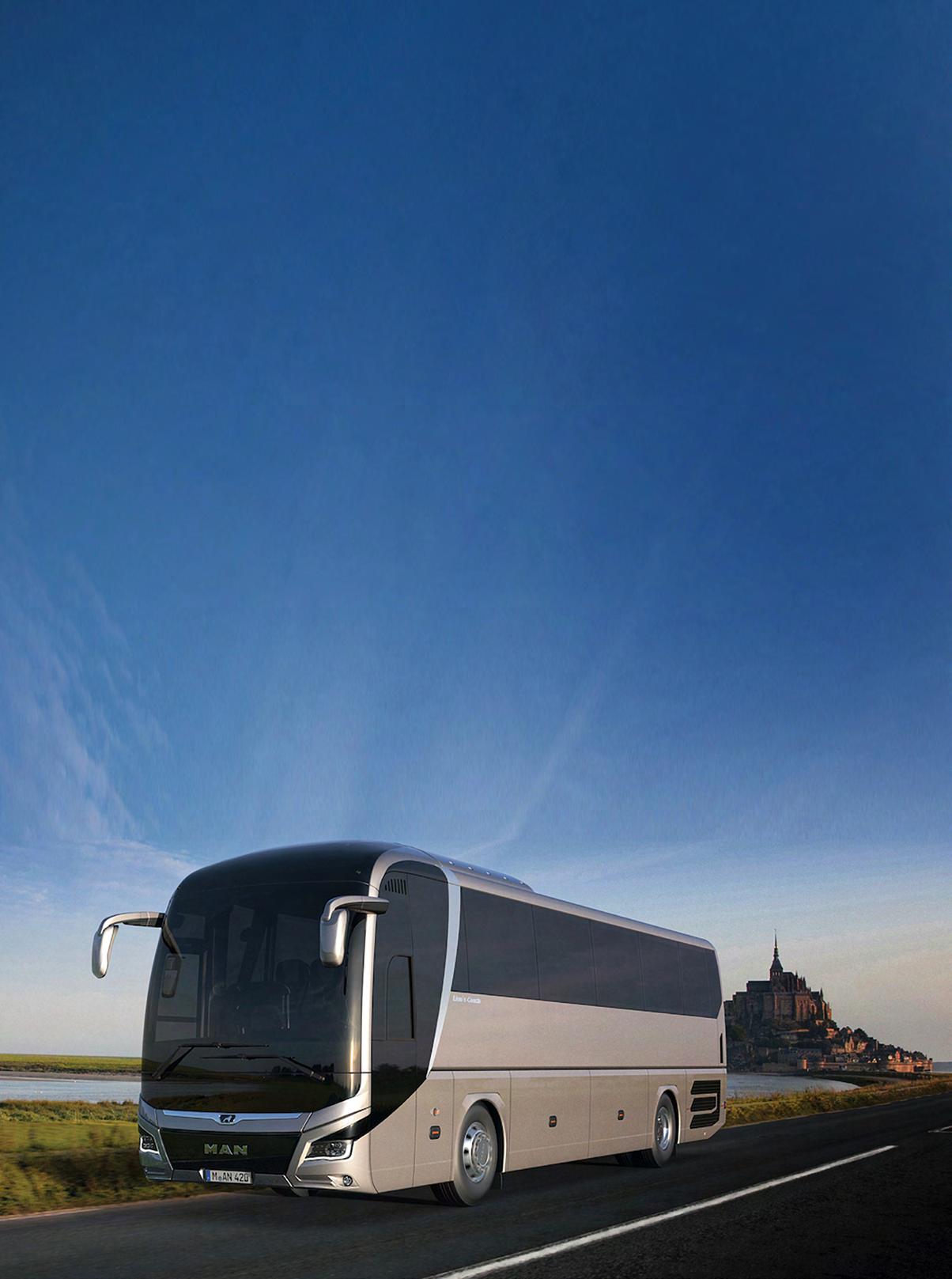
constantly impressed for a number of years thanks to its high reliability and low fuel consumption – and a clear champion when it comes to total cost of ownership,” says Rudi Kuchta, Head of Business Unit Bus at MAN Truck & Bus.
Developed with the daily needs of customers in mind, every last detail of the MAN Lion’s Coach has a focus on efficiency. The TipMatic automated gearbox employs MAN’s new movingoff and gear-shift strategy, optimally matched to the D26 engine. The engine itself is proven to deliver consistent highperformance with low fuel consumption and long maintenance intervals.
The Lion’s Coach also stands out in terms of the innovative safety solutions it provides for drivers, passengers and other road users. The ergonomically designed cockpit offers intuitive operation while driving, meaning that the driver can fully concentrate on the road. The new, bigger glass skylight/ emergency exit hatch features high UV filtration to protect passengers from the sun and offers increased safety by providing an easier option of escape in case of emergency. The MAN Lion’s Coach provides maximum safety every time it takes to the road.
Agility, a leading global logistics provider, is the first logistics company in Abu Dhabi to operate double-trailer trucks, which will improve operational efficiencies for its customers and reduce emissions by cutting the number of trips made.
Agility operates an extensive fleet of trailers in Abu Dhabi. About 50 of those are now double-trailer trucks. Double trailers significantly reduce the number of trips required to haul cargo, decreasing overall wear and tear on tires and vehicles. In the first six months of operation, Agility’s fleet management data demonstrates that double trailers reduce fuel use by 26% per container, eliminating about 2,500

metric tons of CO2 emissions per year.
Houssam Mahmoud, Chief Executive Officer for Agility Abu Dhabi, said:
“In addition to being environmentally friendly, the double trailers will positively impact productivity – and that’s good for both Agility and our customers. We are able to pass a lot of this benefits to our customer by providing greater flexibility and a significant reduction in the number of required trips.”
Acquiring the permit to operate double-trailer trucks took six months of proposals, trials, accident simulations, and safety demonstrations. Agility worked together with a local automotive distributor to develop
the safest possible solution for the market, including Active Brake Assist 4, proximity control, and lane assist.
Agility conducted a transport route survey to identify any routes that might be risky or challenging for drivers.
Agility insisted on lane assist capability for the vehicles, and proposed it to the supplier after determining that drivers would need help to navigate sharp round-a-bouts.
In the United Arab Emirates, Agility has an industry-leading safety record, linking driver incentive pay to safety, rather than speed of operations, and has voluntarily provided extensive third-party training on double trailers to ensure it maintains its excellent record.
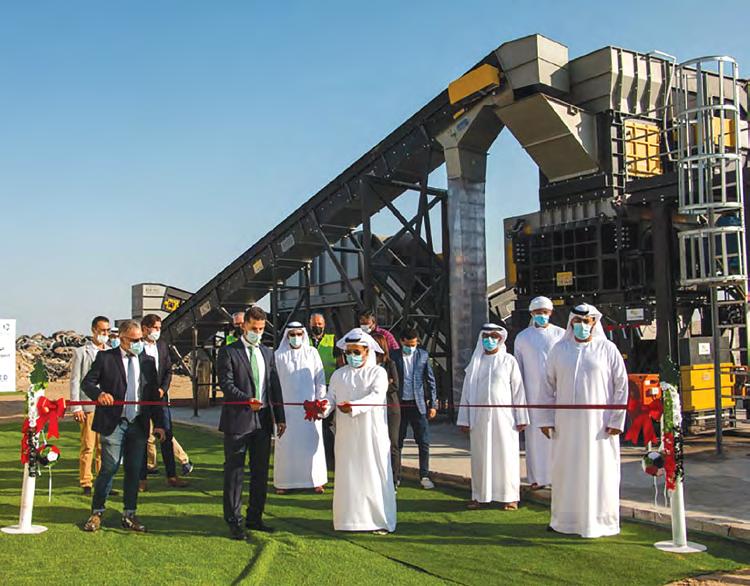
Tadweer announced the opening of its expanded used tire recycling facility in Abu Dhabi. Run in strategic partnership with the private sector, the facility aims to ensure the safe disposal of used tires to avoid public health and environmental risks.
To ensure the facility’s success, Tadweer has contracted with Tarheel Collecting Wastes LLC, an Abu Dhabi-based firm with over 10 years of extensive expertise in waste management and environment services.
Under its partnership with Tadweer, Tarheel collects and cleans used tires prior to their recycling and treatment at the dedicated facility. With a
capacity to treat 70,000 tons of used tires annually, the facility has recycled nearly 17,000 tons of tires since the beginning of 2020 until the end of its third quarter. In collaboration with its Italian partner, Tarheel has set up a new integrated automated plant that has increased its total facility capacity to 100,000 tons annually.
In expanding its used tire recycling facility, Tadweer seeks to significantly reduce the health and environmental risks associated with burning tires which causes serious damage to water, soil, air and public health, and could lead to diseases such as asthma, cancer, allergies, etc. Furthermore, tire burning can have detrimental effects on the planet by driv-
ing global warming that has emerged as one of the most important environmental issues in recent years.
The disposal of used tires in landfills causes serious effects on environment as the rubber can take up to 1000 years to decompose due to its high sulfur content. This has prompted countries across the world to ban scrap tire from landfill with the European Union issuing legislations that include a complete ban on the landfill disposal of tires to protect public health and environment.
Recycling of scrap tires provides an excellent opportunity to use them as an alternative fuel in cement manufacturing. Scrap tires are used in cement kilns where they are burnt
at high gas temperatures of 1000-1200 °C resulting in an instantaneous, complete, and non-smokeless tire combustion.
Tire-derived fuel (TDF) is more cost effective than fossil fuels, and helps preserve natural resources by reducing the dependence on fossil fuels. TDF allows cement manufactures to reduce emissions and production costs, turning scrap tires from an environment and public health challenge to an efficient source of alternative energy.
His Excellency Dr Salem Al Kaabi, Director General of Tadweer, said: “The opening of our expanded used tire recycling facility is aligned with Tadweer’s strategic objective of converting used tires from an economic burden into a valuable economic resource. In addition to reducing the adverse effects of scrap tires on public health and the environment, the expanded facility will go a long way in saving energy and cutting related costs.
“Tadweer is committed to stepping up collaboration with its partners from the government and private sectors to benefit from global expertise in the safe disposal of used tires to protect the environment from the adverse effects of harmful ingredients used in tire production. In addition to reducing pollution significantly, Tadweer’s approach in dealing with such materials has helped local market to source materials locally in line with the highest international quality and safety standards.
“Tadweer will continue to utilize the latest recycling technologies and global best practices to achieve its goal of safeguarding public health, preserving environment and supporting the sustainable development of Abu Dhabi,” Al Kaabi added.

Emirates SkyCargo has started utilising its Airbus A380 aircraft on select cargo charter operations to transport urgently required cargo across its network. The first dedicated Emirates A380 ‘mini-freighter’ successfully transported medical supplies between Seoul and Amsterdam via Dubai.
Working collaboratively with the Engineering and Flight Operations teams within Emirates, the air cargo carrier has optimised the cargo capacity of the Airbus A380 to safely transport around 50 tonnes of cargo per flight in the bellyhold of the aircraft.
Emirates SkyCargo has introduced dedicated cargo operations on the A380 aircraft in response to the surge in the demand for air cargo capacity required for the urgent transportation of critical goods, including medical supplies for combatting COVID-19 in regions experiencing a second wave of the pandemic.
Emirates SkyCargo is working on further optimising the capacity of its Airbus A380 aircraft through measures such as seat loading of cargo and has planned more dedicated cargo flights on aircraft for the month of November.
A leading player in the global air cargo industry with a destination network spread across six continents, Emirates SkyCargo has continued to introduce innovative cargo solutions in line with rapidly evolving market conditions since the start of the COVID-19 pandemic.
The freight division of Emirates offers a variety of options for cargo capacity and connectivity to best match its customers’ requirements. Emirates SkyCargo operates dedicated cargo flights on its Boeing 777-F and its Boeing 777-300ER aircraft including 14 modified Boeing 777-300ER passenger aircraft with seats removed from Economy Class for additional cargo volume. Through its responsiveness and agility,
the air cargo carrier has been able to maintain the flow of essential goods and trade across international markets during the pandemic, often providing a much required helpline to communities around the world.
Taking a lead in the supply chain for the global distribution of a COVID-19 vaccine, Emirates SkyCargo announced recently that it set up the world’s largest EU GDP compliant airside hub in Dubai dedicated for the COVID-19 vaccine. In addition to world-class fit for purpose infrastructure for the storage of the vaccine, the facility would also be able to offer value added services such as repackaging, re-icing and redistribution of the vaccine. The air cargo carrier has also set up a rapid response team to coordinate requests for the movement of the vaccine.
Emirates SkyCargo currently offers cargo capacity on scheduled flights to 135 destinations across the world.
Red Sea Gateway Terminal (RSGT) has taken delivery of two stateof-the-art remote-controlled Ship-to-Shore (STS) cranes, and 10 hybrid-Rubber-Tyred Gantry Cranes (RTGs), as part of the latest steps in the planned expansion of Jeddah Port’s premier facility to double annual container throughput capacity to 5.2 million TEUs by 2023.
“This is another key milestone in RSGT’s commitment and continuous investment to enhance our world-class terminal services. As well as increase the efficiency and capability to meet the different levels of customer needs for next-generation vessels,” stated RSGT CEO Jens Floe.
The new 65-ton twin-lift capacity
STS cranes can accommodate the latest generation of Ultra-Large Container Ships (ULCS) of 24,000+ TEU capacity, with a 70-meter reach and a 52-meter height. RSGT is the only terminal at the Port of Jeddah capable of accommodating the ULCS class’s mega-ships. Manufactured by ZPMC in Shanghai, China, the new semi-automated STS cranes feature advanced technology such as remote control, Optical Character Scanning capability; chassis alignment, and automatic landing systems; vessel profiling, gantry, and trolley positioning systems; and intelligent status condition monitoring systems.
The new hybrid-RTGs will enhance environmentally sustainable terminal
and yard operations by automatically switching to battery power from diesel power to optimize efficiency by reducing fuel consumption and harmful greenhouse gas emissions during container handling operations. . By 2023, RSGT will deploy 24 Super Post-Panamax quay cranes, 67 Rubber-Tyred Gantry Cranes (RTGs)
Plans are underway for a total investment of USD $1.7 billion on infrastructure, equipment, and improvements in line with RSGT’S commitment to Jeddah’s future, ultimately increasing annual container throughput capacity to 8.8 million TEU.
“RSGT is the largest logistics gateway, and the largest container terminal, in Saudi Arabia, and on the Red Sea. “Our goal is to attract and growth the regional transshipment business through continuing providing world-class service to our customer’s vessels and hinterland supply chain,” noted Mr. Floe.
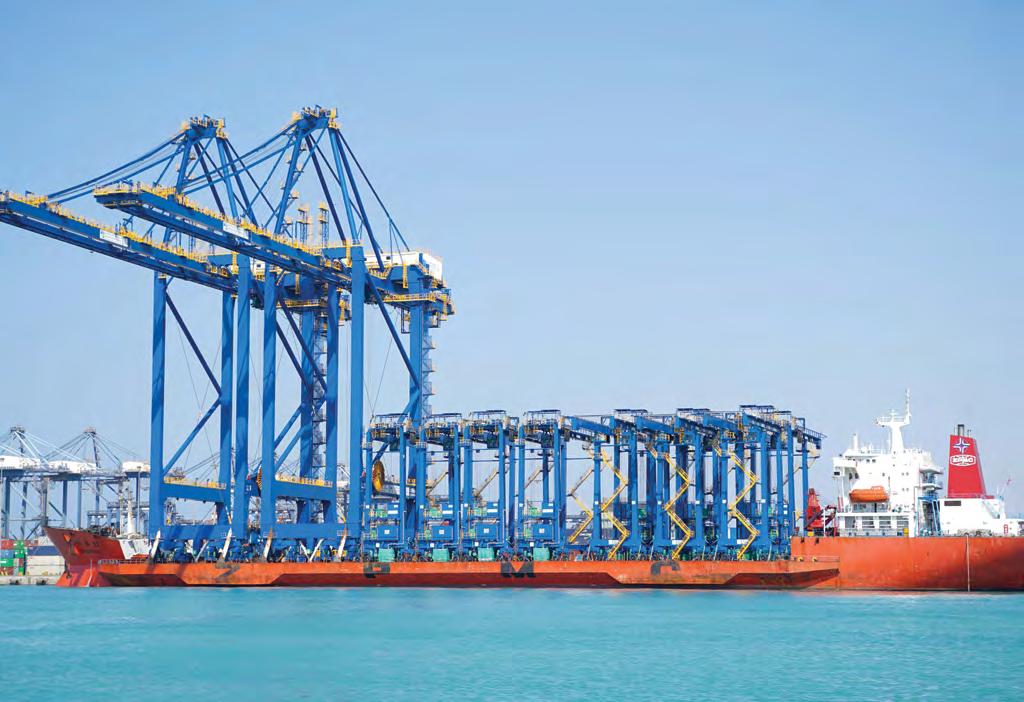

Post-pandemic economic recovery will be built on free flows of trade, functioning logistics and global connectedness.
BY AMADOU DIALLO, CEO, DHL GLOBAL FORWARDING MIDDLE EAST AND AFRICA
The COVID-19 crisis underscored the critical contribution of the logistics sector to keeping communities and economies safe. Transporting medicines, protective equipment and medical supplies around the world throughout the pandemic and amidst heightened geopolitical tensions, the sector was instrumental in safeguarding public health. By maintaining supply chains and regular trade flows,
logistics companies are working behind the scenes to help prop up the global economy through such turbulent times. In the volatile post-pandemic business environment, four key trends will shape the future of this vital sector: globalization, e-commerce, digitalization and sustainability.
Can a global pandemic undo globalization? Sceptics point to the headwinds faced by inter-
national aviation and tourism, closed national borders, and growing regionalization as a signal that perhaps globalization is on its way out. Yet, we see it as the silver lining as even higher levels of interdependencies and connectedness is required to battle the pandemic. Countries, governments, national institutions and international bodies are engaged in the consistent exchange of information and critical supplies, especially as scientists
and medical experts convene to develop a vaccine.
Despite the challenges imposed by national lockdowns and border restrictions, international flows of trade, capital, information and people have remained surprisingly resilient so far. The pandemic may have actually accelerated globalization, through a multiplication of new manufacturing platforms such as Africa. Businesses have diversified their supply chains to reduce supply-side risks from any one country. This is actually good news for the sustainability and resilience of supply chain systems. Equally, companies with a global footprint find themselves in a much better position to withstand the shocks to the economic landscape, more so than companies with a purely national or regional focus. Crucially, an extensive global presence offers strength and flexibility as logistics specialists race to secure all available transport modes and routes to bring essential goods around the globe in the shortest time possible.
The pandemic has brought into sharp focus how much better the world is, when we work together. We are of the opinion that post-pandemic economic recovery will continue to be built upon open trade, a well-functioning digitalized logistics ecosystem and global connectedness.
The growth of e-commerce As governments imposed movement and travel restrictions to curb the spread of the virus, consumers’ only access to goods and services were pushed online for a considerable period. E-commerce became the lifeblood of the retail sector as we witnessed spikes in certain product categories such as food and kitchen products
as people dine in, furniture and computer monitors for home office and workout equipment to stay healthy. The growth in e-commerce volumes has also caused a rapid scaling in the use of technology and digitalization. It is expected that consumers who have newly migrated to digital platforms will potentially not revert back to physical stores for everything they need.
E-commerce equally became the saving grace for small and medium-sized enterprises who can look to expand their customer base and grow their revenue streams. As trade enablers, the logistics sector is facilitating their access to world markets, thereby mitigating the fallout from the pandemic. The future of ecommerce will be built on resilient global supply chains, and a smoothly functioning multimodal transport and logistics sector.
Logistics companies that have long invested in innovation and digital initiatives or are just embarking on this path understand that digitalization can transform their operations and benefit customers in the long run. Covid-19 has accelerated the adoption process but enhancements such as warehouse automation, robotics process automation, data analytics and track and trace technologies have been in implementation mode to address the need for more adaptable, flexible and agile supply chains.
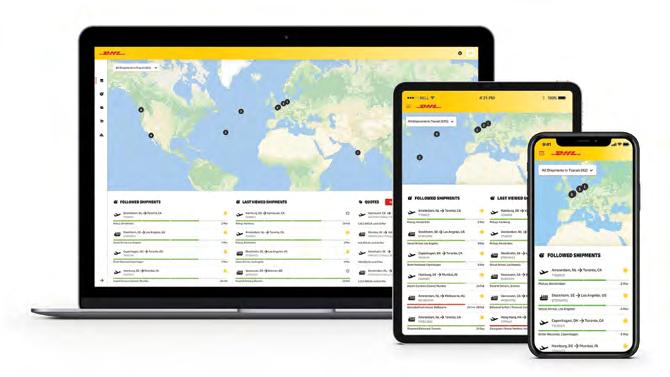
Logistics companies that have long invested in innovation and digital initiatives or are just embarking on this path understand that digitalization can transform their operations and benefit customers in the long run.
With data being visible throughout the system in real time, it allows all stakeholders to plan and strategize better for any future disruptions. For instance, the myDHLi customer portal combines services like online quotation and booking with shipment tracking, document accessibility, and data analyses, enabling customers to manage their logistics. Customers can access transport modes, carbon emissions, and other relevant shipment data in easily accessed, detailed analyses and reports.
In the post-pandemic era, the recently launched DHL Logistics Trend Radar reveals how the adoption of certain technol-
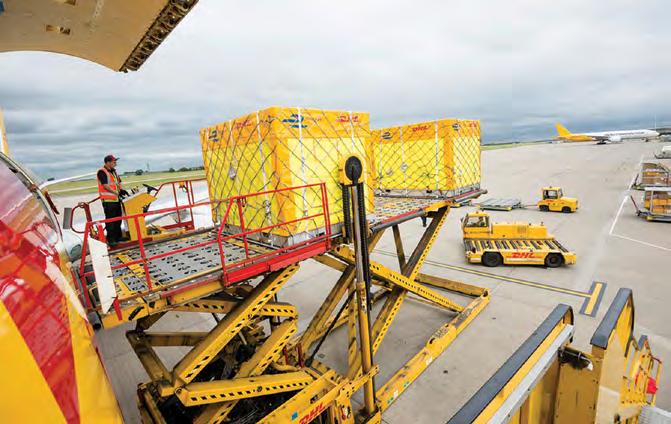
ogies in the near and mid-term will enable the logistics sector to be more sustainable, agile, and efficient.
Another upside of innovation is its ability to help the sector meet its carbon emissions targets. Already, companies that provide green logistics solutions hold a distinct competitive advantage as customers demand greater accountability.
Measures such as electronic shipping or customs documents significantly improve efficiency as well as sustainability by doing away with paperwork. Route optimization technology enables transporting cargo in the most efficient manner thereby reducing carbon emissions, saving time, fuel and money.
For logistics companies navigating the new normal– indeed much like other businesses – the foundation for future business growth and prosperity will be based on being global yet agile, flexible and innovative despite an unpredictable business environment.
Certainly, a big learning for logistics companies from this pandemic has been that ultimately the strength and sustainability of any supply chain is highly dependent on the courage and resilience of people. The people in logistics who worked throughout the pandemic are heroes - just like the frontliners, who contributed to keeping communities safe and healthy.
UAE’s mission to distribute COVID-19 vaccines will cement its position as the global logistics hub
Amid an anticipated surge in vaccine logistics demand, Abu Dhabi (UAE) is poised to cement its position as the global logistics hub to facilitate COVID-19 vaccine distribution across the world, after spearheading the launch of the Hope Consortium.
Comprising leading Abu Dhabi and global entities, the Hope Consortium represents a complete supply chain solution to address vaccine transport, demand planning, sourcing, training, and digital technology infrastructure, and facilitate vaccine availability across the world. The news follows Hope Consortium member Etihad Cargo and the consortium transporting five million vaccines in November on behalf of the Department of Health – Abu Dhabi, which is spearheading the consortium and will oversee regulatory compliance, full chain expertise and scientific insight. The consortium also includes Abu Dhabi Ports Group, Rafed, the healthcare purchasing arm of Abu Dhabi-based ADQ, and Switzerland’s awardwinning SkyCell, which develops next-generation, temperature-controlled logistics containers for the pharmaceutical industry. As part of the Hope Consortium, SkyCell will establish a regional service and manufacturing centre in Abu Dhabi.
The Hope Consortium has pooled its collective expertise to garner a multifaceted capability to provide logistics services to handle over six billion doses from the vaccines being developed and manufactured around the world – whether in single or multi doses – in cold and ultra-cold conditions in 2021, rising to over three times more doses by the end of next year – the largest capacity and logistics capability regionally and one of the largest globally. “The Hope Consortium is a prime example of how Abu Dhabi is leading in providing solutions, capabilities and capacities to help the world get through this global pandemic. It is a continua-
tion of all players’ collaboration of a UAE-based public-private partnership that spans the globe. While assuring vaccine supply to the domestic market, the Hope Consortium will offer international governments, non-governmental organisations, and vaccine suppliers a cohesive solution across every supply chain step – from air freight, regional storage and temperature monitoring, to inventory management, cold and ultracold container solution, regulatory clearance, and healthcare and pharma quality assurance,” explained Sheikh Abdullah bin Mohammed Al Hamed, Chairman of the Department of Health - Abu Dhabi.
“Developing a vaccine is only the first step in getting to a solution, getting that vaccine to the whole globe, while maintaining a robust integrity of temperature is an equal challenge by itself, the Hope Consortium will provide that solution on the highest level of quality.”
“THE HOPE CONSORTIUM WILL HARNESS THE UNITED EXPERTISE OF VARIOUS ABU DHABI AND UAE STAKEHOLDERS TO PROVIDE A FULLY-FLEDGED, END-TO-END SOLUTION SPECIFICALLY FOR COVID VACCINE DISTRIBUTION NEEDS.”
The Hope Consortium has pooled its collective expertise to garner a multi-faceted capability to provide logistics services to handle over six billion doses from the vaccines being developed and manufactured around the world.
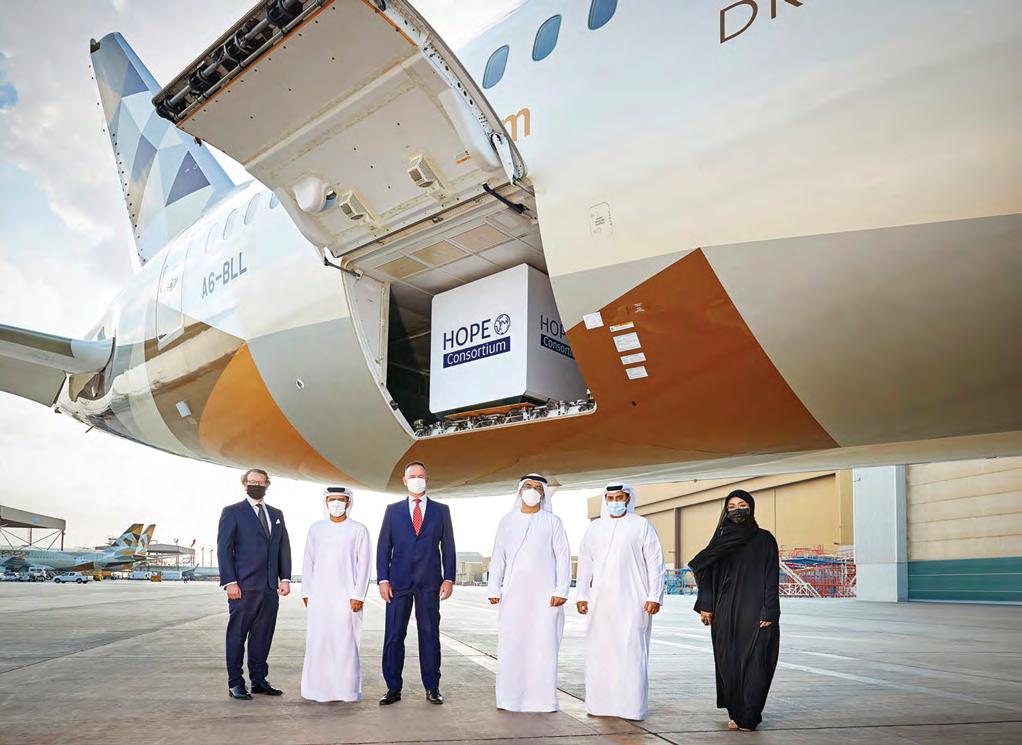

“Consortium partners already have extensive expertise in the global delivery of millions of COVID-19 related items, such as personal protective equipment, diagnostics consumables, vaccines and pharmaceuticals. As we progress talks with vaccine manufacturers to apprise them of our global distribution capabilities, the Hope Consortium will harness the united expertise of various Abu Dhabi and UAE stakeholders to provide a fully-fledged, end-to-end solution specifically for COVID vaccine distribution needs.”
Distribution of the vaccines, which will be stored in Abu Dhabi Ports Company facilities, will be carried out by Etihad Cargo, the first Middle Eastern carrier to gain IATA’s Centre of Excellence for Independent Validators (CEIV) certification for pharmaceutical logistics. The UAE’s national carrier will leverage its extensive intercontinental network, fleet and charter flights to supply vaccines globally.
“With two thirds of the world’s human footprint within a four-hour flight of Abu Dhabi, the UAE capital’s investment in technological expertise and world-class infrastructure facilities means we can serve as a global logistical hub to, and for, the world,” explained Tony Douglas, Group Chief Executive Officer, Etihad Aviation Group.
“Etihad Cargo’s role in the consortium will leverage our outstanding pharmaceutical logistics expertise and specialised pharma and healthcare service, PharmaLife, the IATA CEIV Pharma certified product capable of facilitating temperature-sensitive cargo between +25C and -80C. Our network reach across key destinations will be supported by the utilisation of our charter operations to meet global demand for swift and secure COVID-19 vaccine shipments.
“We are already managing all anticipated shipment elements through our dedicated COVID-19 vaccines workforce,” Douglas added. “A dedicated pharmaceutical handling facility to accommodate increased capacity at our Abu Dhabi hub is also currently under review, as well as additional thermal covers and enhanced capabilities at origin stations based on established pharma trade lanes and specific requests.”
As part of the Hope Consortium, Abu Dhabi Ports, which has the Middle East’s largest capacities for cold chain and ultra-cold storage, will leverage its capabilities as an innovation epicentre serving the Middle East and wider world through Abu Dhabi as a supply chain gateway connecting East and West.
“OUR EXPANSIVE OPERATIONS AT KIZAD ARE AMONG THE LARGEST COLD CHAIN AND ULTRA-COLD STORING IN THE REGION AND ENABLE US TO SUPPORT THE EMIRATE’S DRIVE TO SPEARHEAD GLOBAL IMMUNISATION EFFORTS THAT WILL POSITIVELY IMPACT MILLIONS OF LIVES.”
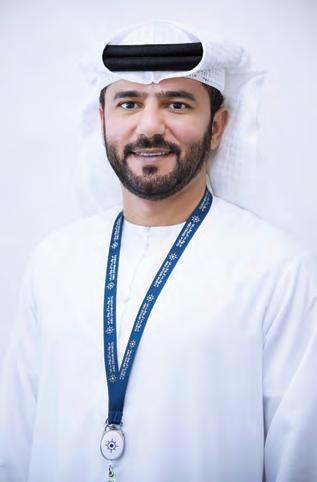
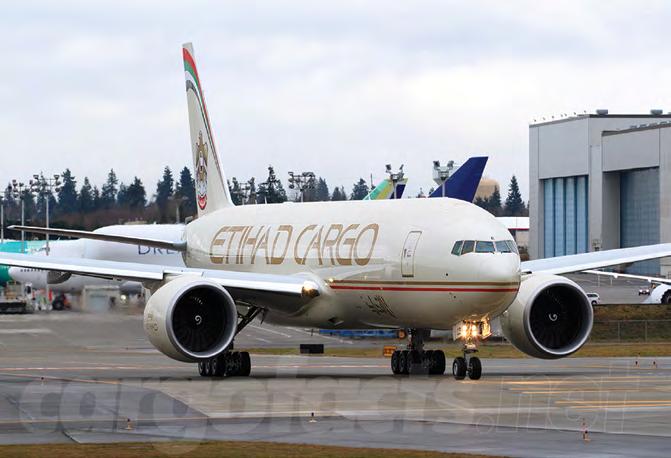
With one of the region’s largest ultra-modern pharmaceutical logistics facilities now operational, Abu Dhabi Ports’ is positioned to positively impact millions of lives around the
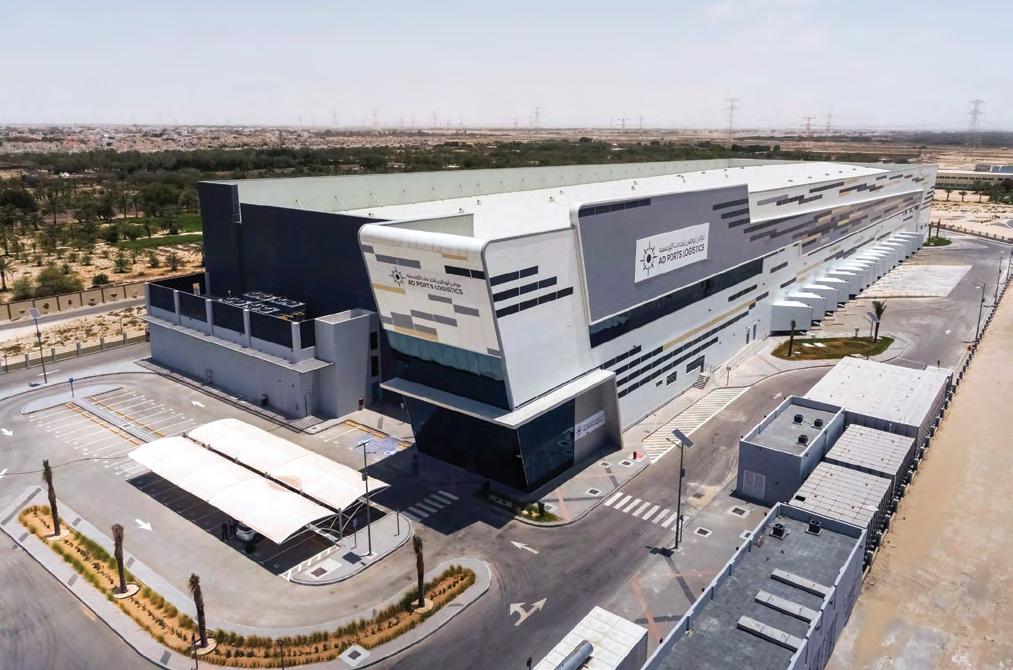
“This collaboration is in line with our ethos of creating innovative ideas, concepts, solutions and opportunities,” said Captain Mohamed Juma Al Shamisi, Group CEO of Abu Dhabi Ports. “Abu Dhabi Ports plays a key role in supporting the Abu Dhabi vision in advancing logistic services in the emirate and leading the post-COVID-19 revival and economic recovery through robust partnerships. Our expansive operations at KIZAD are among the largest cold chain and ultra-cold storing in the region and enable us to support the emirate’s drive to spearhead global immunisation efforts that will positively impact millions of lives. In addition to leveraging our world-class trade facilitation expertise, our efforts also rest on our Maqta Gateway subsidiary, which is playing a leading role in the development of integrated, digital, global commerce.”
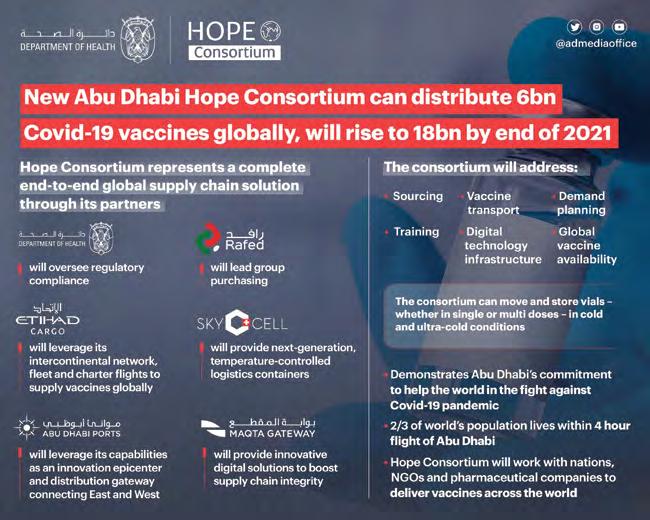
Dr. Noura Al Dhaheri, Head of Digital Cluster – Abu Dhabi Ports, CEO of Maqta Gateway, said: “Supporting the uninterrupted flow of critical cargo, such as medical and food supplies have been crucial in Abu Dhabi Ports’ story during 2020, but the distribution of vaccines will form the most significant success to date. Maqta Gateway is committed towards creating innovative digital solutions to boost the transparency and integrity of the region’s supply chain.”
Rashed Al Qubaisi, Chief Executive Officer, Rafed, which has already managed large volume products before and during the pandemic for the UAE and humanitarian initiatives, added: “Our expertise in centralised procurement services will provide vital support to the consortium. Through our collaboration we will better consolidate our efforts for the benefit of our global partners in the public and healthcare sectors.”
The Hope Consortium intends to transport the vaccines using SkyCell’s hybrid containers. The storage and transportation containers are secured through an IoT monitoring service which tracks temperature conditions to
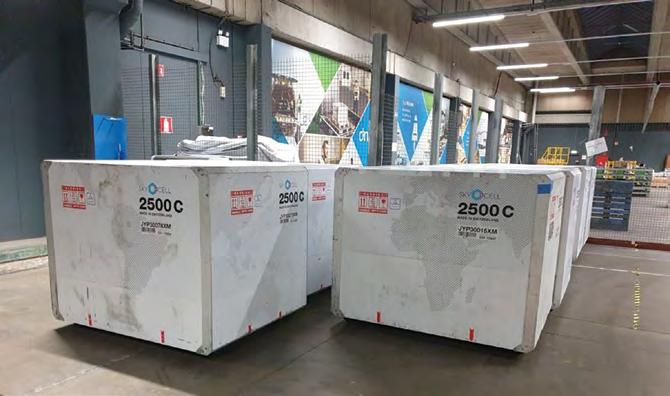
ensure sensitive vaccines are protected even under extreme conditions. With efficient insulation and cutting-edge cooling technology, the containers maintain steady temperatures for an average of 202 hours (8.4 days) and self-recharge automatically in a cooling chamber or reefer truck.
“Our hybrid containers will safeguard the full efficacy of vaccines that are vital to defeat the pandemic, all while reducing long-term business and environmen-
tal costs,” explained Richard Ettl, Chief Executive Officer of SkyCell.
“The Hope Consortium has the right partners, infrastructure and service ecosystem to ensure time and temperature sensitive transportation in a seamless cool chain operation.”
The consortium will also be looking to partner with players and stakeholders to improve its offering and innovative solution for the benefit of humanity.

The storage and transportation containers are secured through an IoT monitoring service which tracks temperature conditions to ensure sensitive vaccines are protected even under extreme conditions.
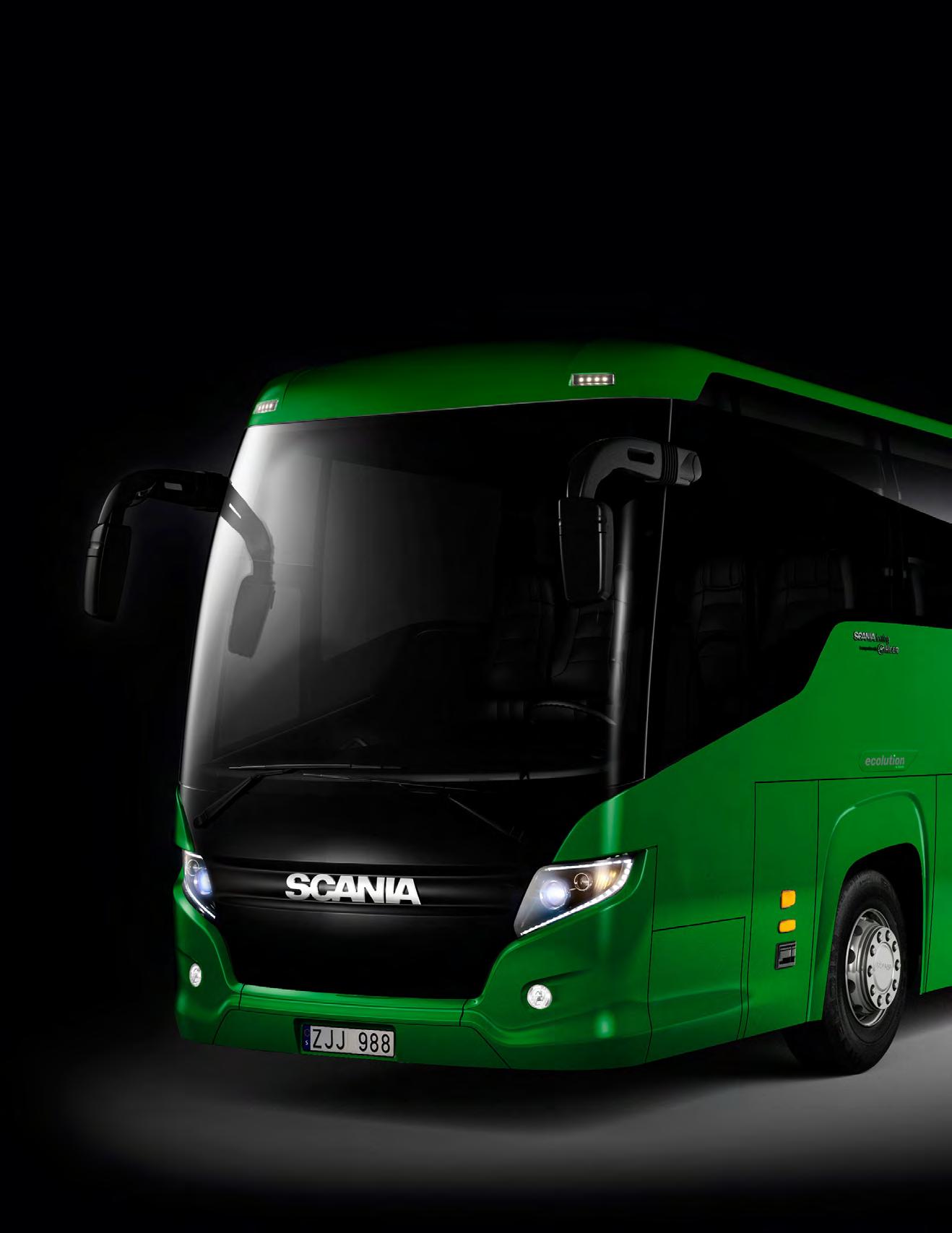

The Scania Touring is a coach designed to meet your needs for occasional service and regular service over long distances. You will enjoy full support from a single point of contact since all parts, maintenance and repairs are backed by Scania’s comprehensive

global service work. The possibility of fast deliveries gives your business plenty of flexibility. If you’re focused on good total operating economy, this coach is destined to be a profit source for years to come.
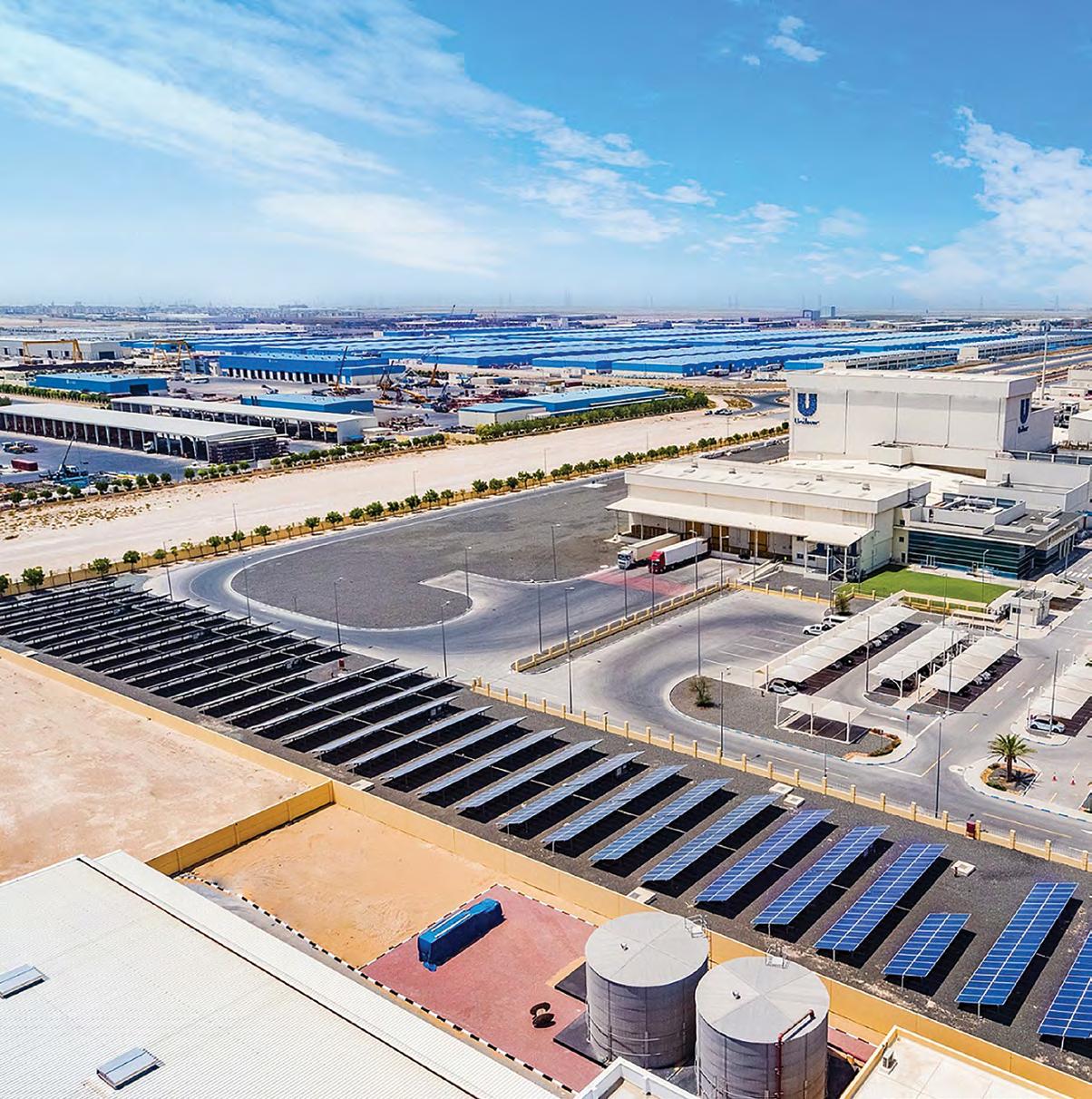

“WITH COMPETITIVELY-PRICED INDUSTRIAL LAND, LIGHT INDUSTRIAL UNITS AND SCALABLE WAREHOUSES, OUR ECOSYSTEM OFFERS A COST EFFECTIVE AND EFFICIENT BUSINESS LOCATION FOR LIGHT TO MEDIUM MANUFACTURING AND LOGISTICS COMPANIES.”
Dubai Industrial City, one of the largest industrial hubs in region, has today announced the completion of major construction and infrastructure projects to help its community keep pace with manufacturing and logistics demand in the UAE.
Two highway extensions to Emirates Road have been completed, giving heavytow trucks direct access to the major causeway linking Abu Dhabi with the Northern Emirates, Oman and Saudi Arabia. By improving the community’s 127-kilometre-long road network, a major part of its enabling infrastructure, the upgrades enhance mobility for more than 750 business partners.
Dubai Industrial City has also inaugurated a 14,000-bed worker accommodation village, which brings the total number of available beds in the community to more than 56,000. The modern, well-equipped, low-rise buildings comprise living quarters, dining areas, leisure facilities and other amenities.
More than AED 410 million has been invested to develop the two projects, both of which have been completed and are now operational.
Since inception in 2004, Dubai Industrial City has seen indirect investments of more than AED 8.4 billion pumped into its ecosystem to create a hub for players in the light and medium manufacturing sectors to set up easily and expand regionally.
Speaking on the completion of major infrastructure works in the community, Saud Abu Al Shawareb, Managing Director of Dubai Industrial City, said: “As a strategic driver and enabler of the Dubai Industrial Strategy 2030, we have continued to invest significantly in the development of our world-class infrastructure to
strengthen our status as a global platform for knowledge-based, sustainable and innovative industries.
He added: “With competitively-priced industrial land, light industrial units and scalable warehouses, our ecosystem offers a cost effective and efficient business location for light to medium manufacturing and logistics companies. These organisations continue to harness disruptive technologies and embrace sustainability to fuel long-term growth in Dubai’s industrial sector, which will play a key role in the UAE’s resilience as the economy gets moving again.”
The manufacturing sector is the fourthlargest contributor to the emirate’s economy and the industry reached a major milestone last year, achieving more than 60% of the Dubai Industrial Strategy 2030’s phase one objectives. Dubai Industrial City is a key stakeholder in the initiative and is responsible for two priority subsectors: such as food and beverage manufacturing and machinery and equipment.
With industrial land plots ranging from 50,000 sq ft to 3,000,000 sq ft available for long-term lease with ready infrastructure, electrical power supply, fibre optic cables, a robust storm water drainage system, and access to major highways, Dubai Industrial City continues to enjoy strong demand for its land plots and warehouses.
The industrial hub is designed around a competitive masterplan divided into sectorfocused zones: minerals, base metals, food and beverages, trading and distribution, transport, chemicals, and machinery and equipment. This has created an integrated end-to-end supply chain representing every aspect from raw materials such as cement and asphalt to food production, manufacturing, packaging, warehousing and logistics.
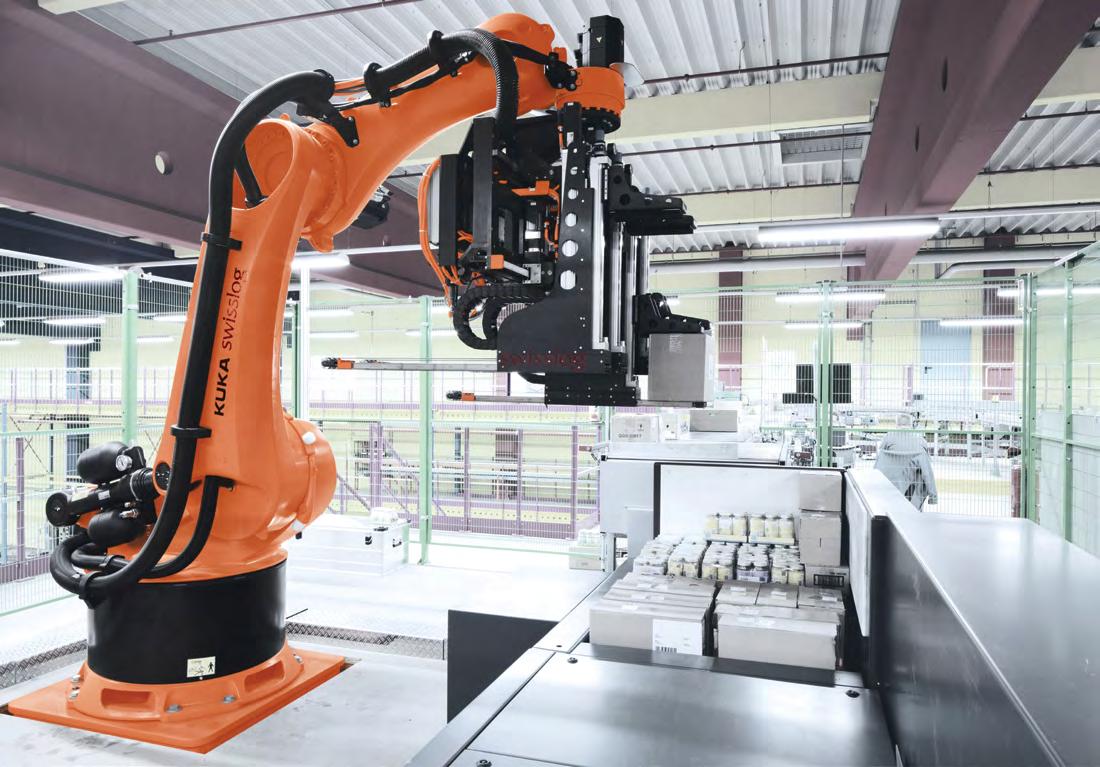
BY ALAIN KADDOUM, GENERAL MANAGER, SWISSLOG MIDDLE EAST
Positions that require working in sub-zero temperatures can be especially difficult to fill in the midst of a tight labor market.
But automation, when tightly integrated with building design and supported by advanced management practices, can resolve labor issues and contribute to improved efficiency.
The UAE is determined to reduce its dependence on oil and become a global leading logistics hub, thanks to its central geographical location in the GCC region and increasing government investment in infrastructure development.
UAE is largely dependent on food and pharmaceutical imports that require abundant cold chain transportation and
storage facilities in the country. The substantial increase of consumer spending on retail goods, which is already estimated as a USD 90 billion market, due to population growth and high demand for temperature sensitive and perishable goods in food and pharmaceuticals, lead to an increase in the adoption of automation in the facilities using automated storage and retrieval system and implementation of modern technology.
According to a report by Ken Research, UAE Cold Chain Market is expected to generate over USD 1 Billion by 2025. The market is expected to register a positive CAGR of 6.1 % in terms of revenue during the forecasted period 2019 - 2025.
Swisslog Middle East shares the following best practices to ensure the implementation of automation in a way that
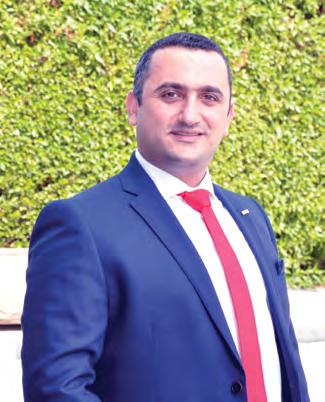
enabled design and management practices that minimized energy consumption and limited exposure of workers to harsh conditions.
Because the automate strategy for pallet high bay warehouses is integral to building design, where possible you should select the automation system before the building is designed. This allows the building designer to fully leverage the capabilities of the system to achieve greater efficiencies.
Among the most popular systems for cold storage automation are stacker cranes and robotic pallet shuttles. Stacker crane systems represent a cost-effective and reliable approach to automated storage and retrieval where the highest density and throughout are not required. Robotic pallet shuttles, such as Swisslog PowerStore, deliver many of the same benefits of stacker cranes but support higher density and throughput. One key benefit of PowerStore is that it can be implemented also in existing buildings in different shapes.
Traditional warehouses with 40-foot ceiling heights are not conducive to efficient refrigeration because the square footage of the roof introduces heat from solar energy, increasing the load on the
refrigeration system. If the facility is a deep-freeze warehouse it will also have a heated floor, which further contributes to the heat load.
These issues can be minimized by a building design that reduces roof and floor square footage without compromising storage capacity. That requires building taller warehouses, enabled by automation systems that support vertical storage such as those mentioned above. Increasing building height can allow the building designer to achieve a footprint approximately one-third that of a conventional facility, creating significant OPEX savings over the life of the facility.
Don’t forget carton handling
Storage and retrieval aren’t the only processes that can be automated in a cold storage warehouse. Downstream operations such as carton handling also lend themselves to automation.
One example is the Swisslog ACPaQ robotic case picking system. It automates the task of building store-friendly pallets by combining light-goods shuttle systems, conveyors and high-performance de-palletizing and palletizing robotic technology from KUKA, a global leader in robotics. The system can be configured for small, mid-size and large distribution centers handling up to 500,000 cases a day.
Automation systems require some special adaptations to perform reliably in lowtemperature environments. Make sure
you have remote visibility into your system to limit technician time in the deepfreeze environment and that your system features cold-resistant lubrication, quick disconnect couplings and other features that allow technicians working on the system to get in and out quickly.
While proper building design and automation system selection can drive down consumption in a cold storage facility, managing demand can also yield savings. Reducing energy costs during highdemand periods minimizes the impact of surge pricing and can drive down costs on a per kilowatt hour basis. The challenge, of course, is costs are highest on high ambient-temperature days when the thermal load on the refrigeration system is at its highest.
The key is to adopt advanced control algorithms and sensors that enable smart energy management in which cold environments are overcooled during periods of low demand, such as overnight, creating a thermal buffer that minimizes cooling requirements during peak periods.
The demand for cold storage warehousing is growing but the labor to man these facilities isn’t. Automation represents the only viable solution and the best approach to automation is one that integrates building design, automation and operating practices in ways that optimize throughput, labor and energy management.
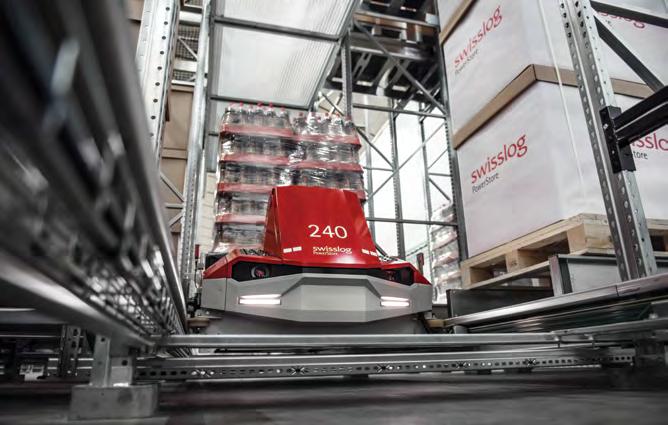
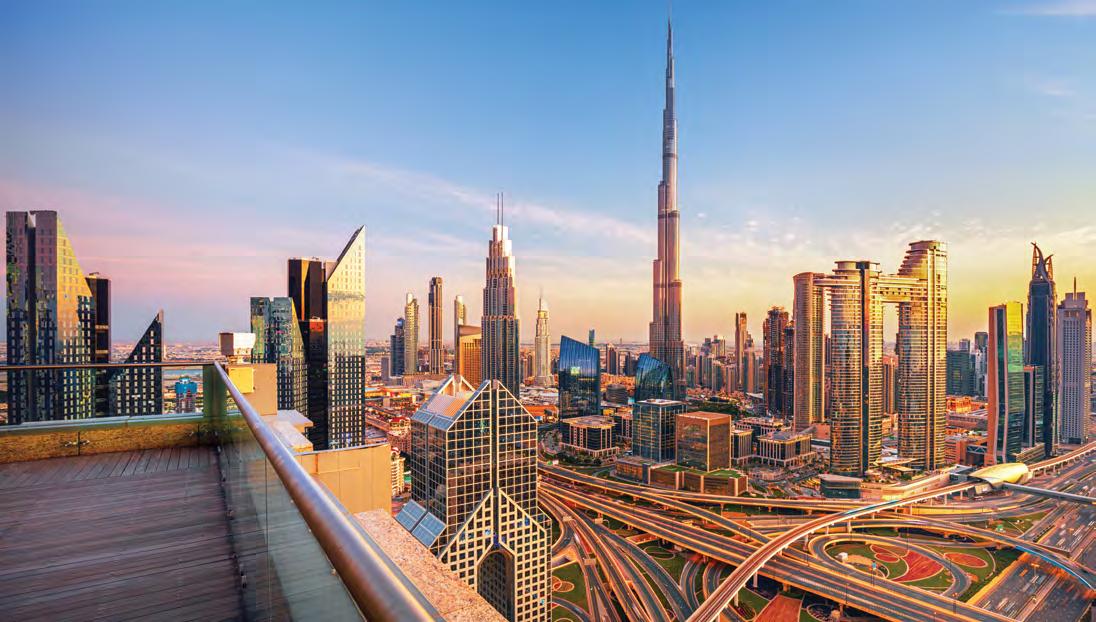
Robert Half’s 2021 UAE Salary Guide reveals latest salary, benefit and hiring trends for more than 130 positions
Robert Half, the world’s first and largest specialised staffing firm, has announced the launch of its 2021 UAE Salary Guide providing indepth data-driven insights into recruitment trends across the Emirates. According to the Salary Guide, based on data from the recruitment firm’s latest national survey of wages and benefits, employers are primarily concerned with retaining talent while salaries across the UAE
are expected to remain under significant pressure in 2021.
Current UAE Salary & Bonus
‘Snapshot’
Consistent with other international markets , the impacts of the current pandemic on remuneration packages aren’t uniform across all UAE industries. Even during periods of rising unemployment, Robert Half’s latest data shows that a majority of companies (73%) are offering remuneration packages that meet or exceed
pre-pandemic numbers. Almost five-in-ten senior managers surveyed (47%) said salaries have held steady since the spread of COVID-19 began, and nearly 3-in-10 respondents (26%) actually noted an increase in base compensation for key roles spanning Accounting & Finance, Financial Services, Technology and HR/Admin. Bonuses are still being paid this year. A little over half the managers surveyed (52%) are making payments that either meet or exceed their pre-COV-
ID-19 equivalents, whilst 38% are offering less, year-on-year.
“Employees are a company’s most valuable asset for navigating both short-term disruption and achieving longterm growth,” said Gareth El Mettouri, Associate Director, Robert Half Middle East, in launching the 2021 UAE Salary Guide. “Workers have been stretched to the limit during the pandemic, often putting in longer hours, taking on additional responsibilities, acquiring new skills and using recent months to reassess their career priorities. Professionals are much savvier about the market value of their skills and current salary trends than before. Employers should research compensation trends regularly, be prepared to move quickly and negotiate effectively in order to retain key employees or hire promising talent.”
COVID-19 is re-shaping the employee benefits landscape. At the international level, many managers surveyed have incorporated new worker benefits since the start of the pandemic, including, but not limited to:
> At-home office equipment allowances
> Mental health resources or assistance
> Wellness programmes
Remote- and Flexible-Working Are growing in demand
Flexible working has been an important consideration for a growing number of employees for some time, which has now been further amplified by COVID-19. Maintaining an appropriate work-life balance has become an important priority as the pandemic continues to evolve, with 71% of managers committed to offering remote work for the foreseeable future.
Flexitime policies – i.e. allowing employees to structure their workday or week as they please – are in place amongst 61% of companies, along with working a compressed week (52%) and permanent parttime arrangements (51%) also favoured by the majority of survey respondents. El Mettouri adds: “Salary definitely remains an important consideration. But nonmonetary benefits such as enhanced wellness resources, remote- and flexibleworking options and achieving a better work-life balance are becoming increasingly important. With current economic

“Employees are a company’s most valuable asset for navigating both shortterm disruption and achieving long-term growth.”
volatility likely to continue for some time yet, even the prospect of a salary freeze over coming months can be made more palatable if managers can ensure that nonmonetary benefits are sufficiently tai-

lored to be supportive and beneficial for employees.”
UAE companies are still hiring UAE employers are recruiting. There is strong demand for new talent, particularly across the Utilities, Distribution, E-commerce, Telecoms, Insurance and Healthcare sectors. HR Consultants, Legal Managers, Finance and Business Analysts as well as Managing Director roles all remain in high demand. Additionally, there is a clear shift in the skill sets being sought by hiring managers, with an uptick in demand for ‘soft’ skills such as agility, creativity and communication alongside core technical competencies in order for personnel to have the optimal attributes needed to navigate what remains a very challenging business climate.
“Although some sectors clearly had to downsize due to the COVID-19 crisis, many companies showed resilience by adapting quickly to the new business reality,” El Mettouri observes. “The move to working from home, accelerated rates of digital transformation, the development of virtual procedures for recruitment and onboarding, the encouragement of new skills and the emergence of more flexible workforce models have profoundly changed the way companies work, recruit and offer products and services. All of these developments likely foreshadow how we will work in the post-pandemic era. The future of work has not only arrived, it’s here to stay.”
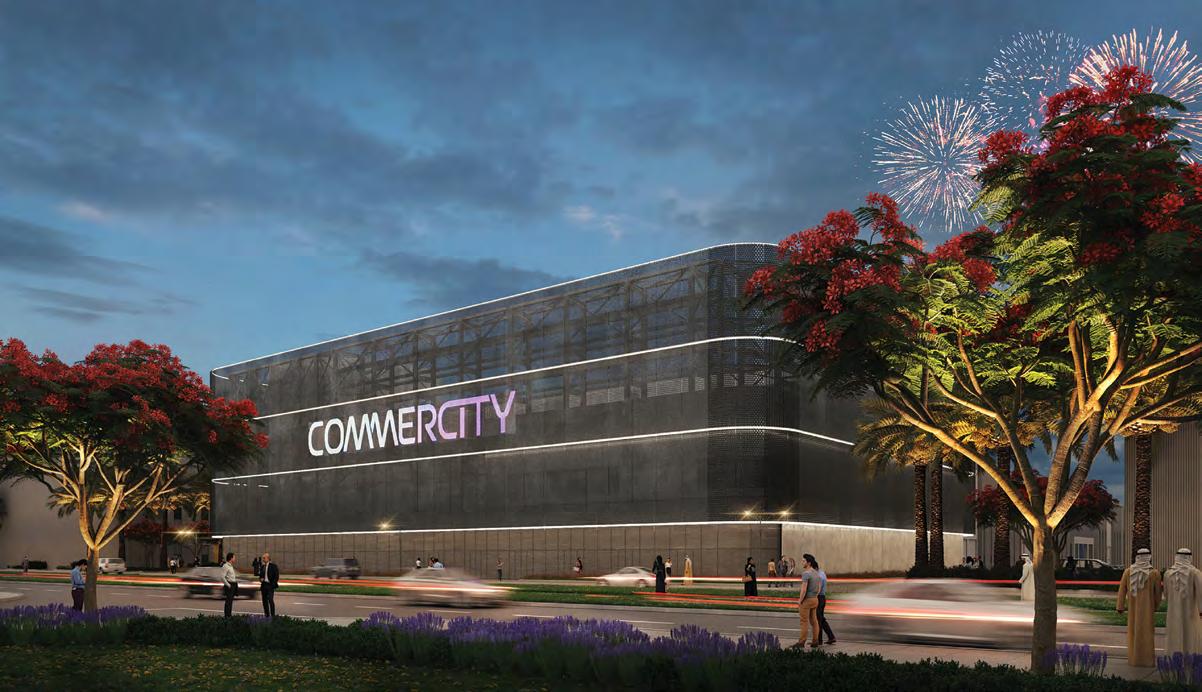
Dubai CommerCity partners with Hellmann and DHL Express to provide end-to-end logistics services for customers
Dubai CommerCity, the region’s first dedicated e-commerce free zone has signed an agreement with Hellmann Worldwide Logistics to manage and operate a shared, multi-client warehouse within the logistics cluster of the free zone. The partnership was announced during Seamless Middle East 2020 – one of the leading
events in the e-commerce space.
Dubai CommerCity is set to elevate Dubai’s position as a leading hub for international e-commerce, supporting economic diversification and smart transformation. It is a AED 3.2 billion (USD 0,9 billion) project covering an area of 2.1 million square feet in Umm Ramool, right next to DXB International airport, the prox-
imity to the center of Dubai and airport offers fantastic speed to the consumer.
Hellmann will provide endto-end warehousing including services like order management systems and streamlined customs clearance processes. As part of end-to-end logistics services, Hellmann will also offer last mile delivery services, through its last mile partner DHL Express, from the
bonded warehouse directly to the consumer. The multi-client warehousing customers will be serviced by a dedicated team from Hellmann who will manage consumer and shipment queries including tracking and tracing of deliveries. The clients will be supported with reporting dashboards based on their individual requirements. Customers at Dubai CommerCity will be able to benefit from pre-negotiated, market competitive warehousing and last mile conditions along with economical delivery lead times and coverage. Customers can also avail unique and exclusive pay-as-you-go storage options which is highly cost efficient and which allows flexibility to scale their operations in line with demand.
Amna Lootah, Assistant Director General, DAFZA said: “Collaboration and partnerships will continue to be critical for the future growth of e-commerce and for economic recovery across the globe. This year has highlighted the vital role that e-commerce and logistics play in the global economy. These sectors will be crucial for enabling other industries to prosper and for supply chain to be strengthened. Through this partnership with Hellmann and DHL Express, we will support Dubai CommerCity’s customers in their journey towards development and growth in the e-commerce industry. This will have an important role to play in the diversification of the UAE economy and future sustainable economic development.”
“The e-commerce sector continues to drive innovation, digitalization and strategic alliances. The objective of this agreement with Hellmann is to offer businesses end to end high level, streamlined logistics services including inbound and outbound support in the MEASA, as well as in other key markets across the world”, she added.
Madhav Kurup, Regional CEO Middle East and South Asia, of Hellmann Worldwide Logistics commented, “We are excited at this opportunity to create a unique operating model with Dubai CommerCity that will be the first of its kind in the Middle East. Dubai CommerCity’s strategic partnership with such a globally renowned service provider as Hellman Worldwide Logistics and our

“The e-commerce sector continues to drive innovation, digitalization and strategic alliances. The objective of this agreement with Hellmann is to offer businesses end to end high level, streamlined logistics services including inbound and outbound support in the MEASA, as well as in other key markets across the world”
last mile partner, DHL Express, will enhance Dubai CommerCity’s service scope as a specialized free zone compared to the traditional infrastructure provider model.”
Geoff Walsh, UAE Country Manager at DHL Express, said: “Our partnership with Dubai CommerCity and Hellmann demonstrates DHL’s continued commitment to delivering value to our e-commerce customers, as they are currently
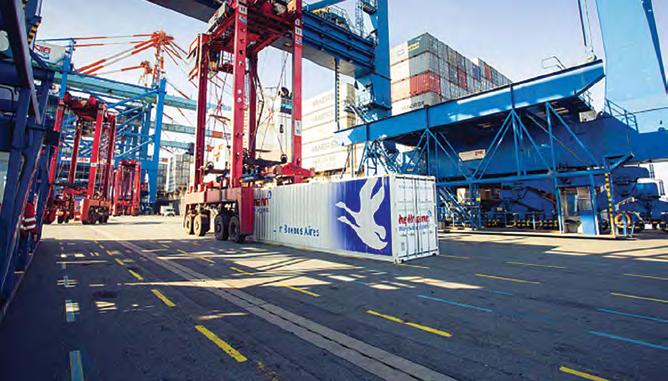
operating in a challenging and volatile business environment. We are continuously looking to provide logistical support to any new initiatives that will help the economy and SMEs expand in the region and internationally. Hellmann’s end to end warehousing solutions will help our customers capture business opportunities that they may have otherwise lost.”
The e-commerce retail market in the Middle East & Africa is expected to grow by 20% to reach USD 26 billion in 2022, which outpaces the global growth of 13%. The GCC is also expected to contribute 43% of MEA’s e-commerce retail market by 2022 ,”
Dubai CommerCity will provide advanced opportunities for global and regional manufacturers, as well as distributors and global e-tailers. It will facilitate a business ecosystem for companies in the e-commerce industry such as, web developers, photoshoot studios, call center service providers and others. Divided into three main clusters - business, logistics and social, Dubai CommerCity will be a home for innovation, new technology, plug & play ecommerce ecosystem, state of the art services and modern infrastructure.
I joined Renault Trucks Greater Middle East 4 years ago, and since then, it has been an amazing journey. My main goal is to position Renault Trucks among the top three in each of the (15) markets we represent and help our dealer network build a sustainable business model by expanding our customer base and establishing lifetime business partnerships with our customers across the region.
I work with Renault Trucks as Product & Market Manager. My main responsibility is to drive product segmentation & strategy within our markets. I collaborate with our dealer network to provide the best in class product solutions to our customers. I am also responsible for our commercial crew’s product competence development so that they remain updated with the latest Renault Trucks product innovations. My work relates closely to the aftersales team since we are working with our customers from a Total Cost of Ownership perspective to keep their operating cost minimized and capitalize on uptime for maximum profitability.
My passion for trucks is unsurpassed; this is why my 14 years of career life has been in the trucks industry. Before joining Renault Trucks, I had the opportunity to work with respected organizations in UAE, Saudi, Qatar & Egypt. Working in the field helped me see the other side of the table. When working with the dealer, you are closer to your customers, so you understand their needs and act spontaneously to fulfill their expectations.
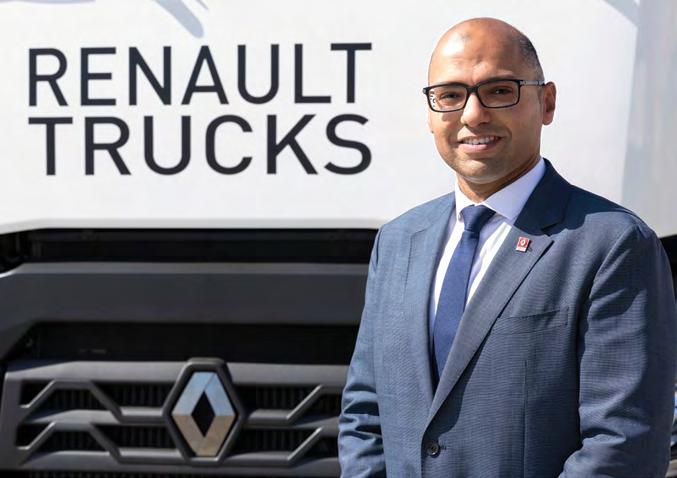
“I believe teamwork is vital for achieving any long-term success.”
Being a front liner helped me a lot once I joined Renault Trucks. It made things far easier conveying the customer needs to our HQ, working closely with them in developing product solutions, which meet our tough operating environment in the Middle East. This brought significant value to our customers once these solutions were implemented into their fleets. I believe delivering excellence requires persistent effort; this is why I spend my best time in the field with our customers, looking for development opportunities.
I live by the quote, “If you want to go fast, go alone; but if you want to go far, go together.” I believe teamwork is vital for achieving any long-term success. My department works cross-functionally with all other departments like sales, aftersales, and marketing. Our team is purpose-driven and well-integrated; we incorporate each other’s ideas and thoughts to deliver what we believe is best for our customers. Teamwork is not only limited to our teams; we also work very closely with our dealer network to align our objectives and strategies.
